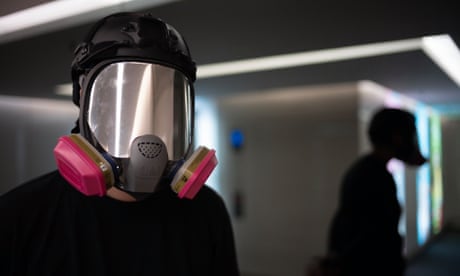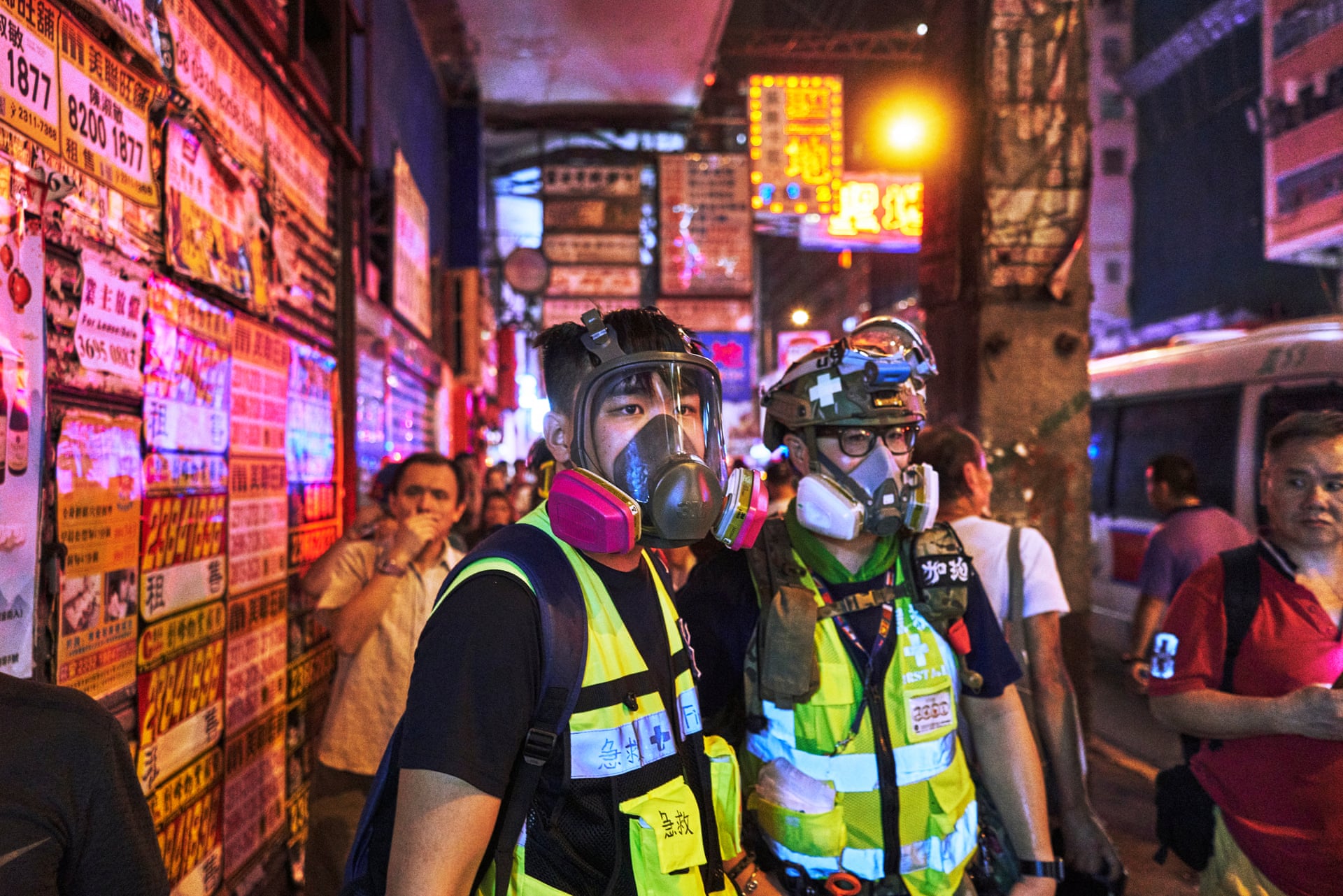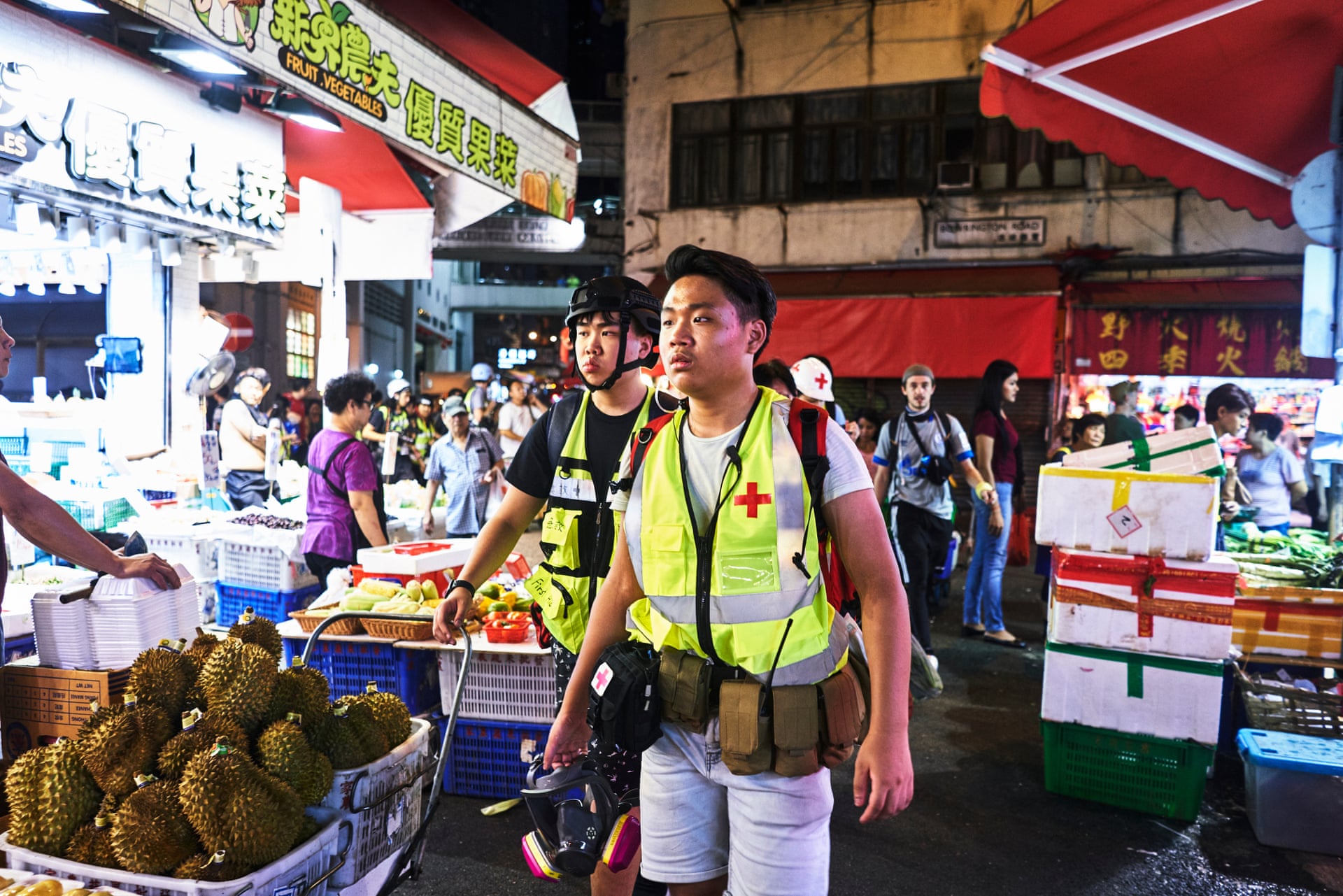Informal group including social workers, pastors, lawyers and medics have banded together to support demonstrators
By Lily Kuo in Hong Kong
Uncle Wong, 82: protecting Hong Kong protesters with his walking stick
Last Saturday, as Hong Kong braced for another weekend of youth-led mass pro-democracy protests, a group of middle-aged and elderly volunteers prepared for their own rebellion.
Gathered in a metro station, they put on bright yellow vests and fumbled with goggles and gas masks. They listened attentively as an organiser went over tactics for slowing the police down and letting protesters escape: distract the officers by asking for change, to borrow their phone, or even by pretending to faint.
“All we need to do is buy them a few minutes so the youngsters can get away,” said Wong, 82, who has been placing himself between the protesters and the police over the last several months.
Gathered in a metro station, they put on bright yellow vests and fumbled with goggles and gas masks. They listened attentively as an organiser went over tactics for slowing the police down and letting protesters escape: distract the officers by asking for change, to borrow their phone, or even by pretending to faint.
“All we need to do is buy them a few minutes so the youngsters can get away,” said Wong, 82, who has been placing himself between the protesters and the police over the last several months.
“We tell the police: ‘Please don’t beat them up. Let them go. Maybe you could advance a little slower.’”

Hong Kong: ‘Revolution is war, and no war is without bloodshed’
Wong’s group, known as the Guardians, whose stated mission is “protect the children”, is one of many that have formed in response to pro-democracy protests.

Hong Kong: ‘Revolution is war, and no war is without bloodshed’
Wong’s group, known as the Guardians, whose stated mission is “protect the children”, is one of many that have formed in response to pro-democracy protests.
The demonstrations have led to more than 1,000 arrests and severely strained relations between Hong Kong authorities and the public.
Observers say the informal groups of volunteers – from social workers and pastors to lawyers, doctors and first-aid medics – are a testament to the far-reaching impact of the demonstrations.
Ma Ngok, an associate professor at the Chinese University of Hong Kong, said: “This is part of the spirit of the whole movement that different sectors of people are trying to see how they can contribute to the cause. A lot of people are still unhappy about the situation so they try to figure out what they can do by their own means.”
Later on Saturday, Uncle Wong and his group found a standoff between protesters and police near the airport.
Observers say the informal groups of volunteers – from social workers and pastors to lawyers, doctors and first-aid medics – are a testament to the far-reaching impact of the demonstrations.
Ma Ngok, an associate professor at the Chinese University of Hong Kong, said: “This is part of the spirit of the whole movement that different sectors of people are trying to see how they can contribute to the cause. A lot of people are still unhappy about the situation so they try to figure out what they can do by their own means.”
Later on Saturday, Uncle Wong and his group found a standoff between protesters and police near the airport.
As soon as they arrived, Wong moved quickly to the front, armed with a pair of swimming goggles and his walking stick held aloft in front of him as a barrier.
A few hours later, when the police charged at protesters, he did not flinch.
One young demonstrator ran past and patted him on the shoulder.
“I have no regrets,” Wong said.
“I have no regrets,” Wong said.
“I’m willing to take the blow for them. This whole protest needs everyone’s support. If you don’t come out today there may not be a tomorrow.”
Hong Kong’s leader, Carrie Lam, has said she will withdraw an extradition bill that first triggered protests in June.
Hong Kong’s leader, Carrie Lam, has said she will withdraw an extradition bill that first triggered protests in June.
But protesters have vowed to continue demonstrating until all their demands are met, including direct democratic elections and an independent inquiry into police conduct.
As the Guardians put themselves between police and protesters last weekend, teams of first-aid workers were sent to various locations of potential clashes throughout the city.
As the Guardians put themselves between police and protesters last weekend, teams of first-aid workers were sent to various locations of potential clashes throughout the city.
Social workers monitored social media, looking for signs of self-harm or severe emotional distress among protesters.
Others patrolled the streets, carrying megaphones to call out the names and identification numbers of demonstrators being arrested so that lawyers could find and help them.
Hammond Tang, 16, a former Scout, was part of a team of first-aid volunteers in Causeway Bay, a shopping district where the police were rumoured to be preparing to move on protesters.
Hammond Tang, 16, a former Scout, was part of a team of first-aid volunteers in Causeway Bay, a shopping district where the police were rumoured to be preparing to move on protesters.
Equipped with walkie-talkies and packs of medical supplies, they were on high alert for “TG” – teargas.
Observers say the volunteers are a testament to the far-reaching impact of the demonstrations.
During the last three months, Tang’s responsibilities have shifted from pouring saline over those hit by teargas to tending to patients hit by rubber bullets and beanbag rounds.
“We didn’t expect this many injuries,” he said.
Tang’s responsibilities also include breaking up fights between protesters and critics – altercations that happened almost daily, he said.
Tang’s responsibilities also include breaking up fights between protesters and critics – altercations that happened almost daily, he said.
This month a middle-aged man threw a brick at a protester outside Hong Kong airport and was soon surrounded by protesters kicking and hitting him.
Tang, a stocky rugby player, raced over and covered the man with his body.
A secondary school student, Tang is not always emotionally prepared for the amount of violence he encounters.
A secondary school student, Tang is not always emotionally prepared for the amount of violence he encounters.
“Seeing everyone safe is our energy. To save more people … the thank you from those patients is what keeps me going to the frontline.”
Many of these groups are building on Hong Kong’s increasingly active civil society, boosted in 2014 during a wave of pro-democracy protests known as the umbrella movement, a precursor to the current demonstrations.
Victoria Hui, an associate professor of political science at Notre Dame University, said: “They were already there to jump into action. As the protests have evolved, preexisting groups and new groups have emerged to fill new needs.”
Many of these groups are building on Hong Kong’s increasingly active civil society, boosted in 2014 during a wave of pro-democracy protests known as the umbrella movement, a precursor to the current demonstrations.
Victoria Hui, an associate professor of political science at Notre Dame University, said: “They were already there to jump into action. As the protests have evolved, preexisting groups and new groups have emerged to fill new needs.”
In some ways they are also a reaction to what some see as the creeping politicisation of civil society, as pro-Beijing figures are appointed to head different public sectors.
Hui said: “The worry is that Beijing already encroached on the civil service in the aftermath of the umbrella movement.”
Unlike formal civil society organisations, these groups are loosely organised and often started by individual calls for action online, mirroring how the protesters have operated.
Unlike formal civil society organisations, these groups are loosely organised and often started by individual calls for action online, mirroring how the protesters have operated.
A group of Christians maintain a 24-hour channel on Telegram for protesters to share their feelings. Supporters organise supply collections, leaving money, food vouchers, and clothes in metro stations for protesters to change into from their signature all-black outfits.
The groups are loosely organised and often started by individual calls for action online.
Observers say the growth of these satellite protest groups is evidence of the public sympathy demonstrators still command, even after months of political unrest that has damaged one of the strongest economies in the region.
On 1 September, as protesters paralysed traffic links between the airport and the city and demonstrators began a seven-mile (12km) walk back to the city, Daniel, 42, was one of hundreds of volunteer drivers who had arrived to ferry stranded protesters home.
Daniel, a government worker who had never volunteered before, was watching a livestream on Facebook when he saw the call for drivers.
On 1 September, as protesters paralysed traffic links between the airport and the city and demonstrators began a seven-mile (12km) walk back to the city, Daniel, 42, was one of hundreds of volunteer drivers who had arrived to ferry stranded protesters home.
Daniel, a government worker who had never volunteered before, was watching a livestream on Facebook when he saw the call for drivers.
After discussing it with his wife, he arrived at a nearby bridge where dozens of drivers had converged and a volunteer told him where to go.
Daniel stayed out until almost 2am, waiting in case he could be of assistance.
He said: “They are Hong Kong’s future. I want to do something to help them. We have to trust each other and stick together.”
As the protests have divided society, some groups have sought to act as objective observers.
He said: “They are Hong Kong’s future. I want to do something to help them. We have to trust each other and stick together.”
As the protests have divided society, some groups have sought to act as objective observers.
Since mid-August, the Hong Kong Neutral Legal Observers Group, a group of about 50 volunteers from the legal sector, have been attending the protests.
In green vests identifying themselves as neutral, they attend the protests in shifts, documenting their observations for reports to be published later.
In green vests identifying themselves as neutral, they attend the protests in shifts, documenting their observations for reports to be published later.
They also hold public workshops educating residents on their legal rights and obligations.
“Our purpose is to observe public gatherings and defend the rule of law,” said one of the conveners of the group, a partner in the Hong Kong office of an international law firm, who asked not to be named out of concern of possible retribution.
“Our purpose is to observe public gatherings and defend the rule of law,” said one of the conveners of the group, a partner in the Hong Kong office of an international law firm, who asked not to be named out of concern of possible retribution.
“We hope that the presence of lawyers might serve as a reminder of how important it is to respect the law and the rule of law.”


Aucun commentaire:
Enregistrer un commentaire